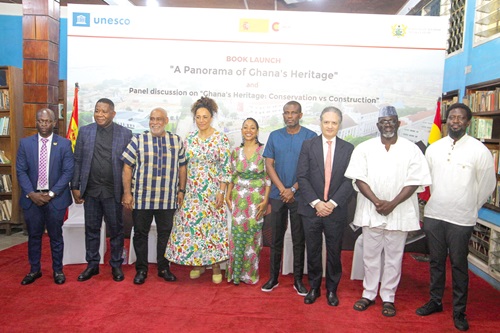
Spanish Embassy launches book on Ghana's heritage
The Spanish Embassy in Ghana has launched a book that seeks to honour Ghana's rich culture and historical heritage.
Titled, "A Panorama of Ghana's Heritage," the 110-page book, which is a joint initiative by UNESCO, the Embassy of Spain in Ghana, the Ministry of Tourism, Arts and Culture (MOTAC) with funds from the Spanish Agency for International Development (AECID), documents images and information on the diverse icons of Ghana's heritage sites including European forts and castles; Islamic mosques; Christian cathedrals; slave trade site, artefacts and technology in all the regions of the country.
From well-known forts and castles in the Central Region to lesser-known ones scattered around other regions of the country, the book, written in both English and Spanish, is in two parts.
The first part chronicles images of Ghana's heritage, each with a historic and cultural annotation and the second part comes with notes on the images presented in part according to regions.
It is the second edition. The first edition was published in 2012.
Good investment
The Spanish Ambassador to Ghana, Javier Gutierrez, at a ceremony last Tuesday to launch the book said with good investment and cultural preservation, Ghana could attract more visitors into the country and generate wealth.
Referring to a Daily Graphic aerial photograph of the John Atta Mills High Street which was captured in one breath, some landmark buildings such as the Kwame Nkrumah Memorial Park, the Centre for National Culture, Old Parliament House, James Town, Light House and the Supreme Court, Mr Gutierrez said those buildings were monuments that would be attractive for many people, especially for Europeans, including Spaniards.
He said that area (the High Street) could attract many visitors to Ghana which would in turn generate development. The United Nations Resident Coordinator in Ghana, Charles Abani, said the cultural heritage of a country was not just a significant graph, but a beacon guiding to a brighter future.
He, therefore, stressed the need for all to join hands together to safeguard Ghana's cultural heritage. Touching on Ghana's rich historical and cultural treasures, he said they not only held historical significance but also served as catalysts for economic development.
"Let us ensure that we tap into the wealth of the national heritage elements to bring wealth while preserving them for posterity," he advised.
Cultural legacy
The UNESCO Representative to Ghana, Edmond Moukala N'Gouemo, said Ghana's cultural legacy was a vibrant force for sustainable development, and as such by involving local communities in the decision-making process and utilising traditional knowledge systems such as the environmentally friendly methods of kente weaving, it would be able to promote economic development that was based on cultural pride and environmental responsibility.
"Let us continue to value and guard our world heritage as we look into the future. By working together, we can create thriving and welcoming communities where our common history motivates us to fashion a better future using our creative and ethical method and employing new technologies such as AI," he said.
The Director of the George Padmore Research Library on African Affairs, Simon Teye, said the library had a collection of 101,029 books and other relevant documents, including files of presidential papers collected from George Padmore when he was a special advisor to Dr Kwame Nkrumah; Dr Nkrumah’s files in handwritten format, all the books published by Dr Nkrumah, books on the cultural heritage of Ghana and daily newspapers.
He said, unfortunately, all those valuable documents were not in a digital format and so they could be lost if they were not preserved. The Deputy Minister of MOTAC, Mark Okraku-Mantey, said Spain had over the years shown genuine interest in Ghana’s well-being, and that was something the government appreciated.
